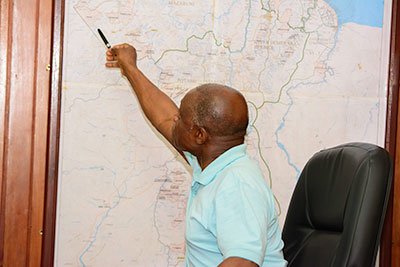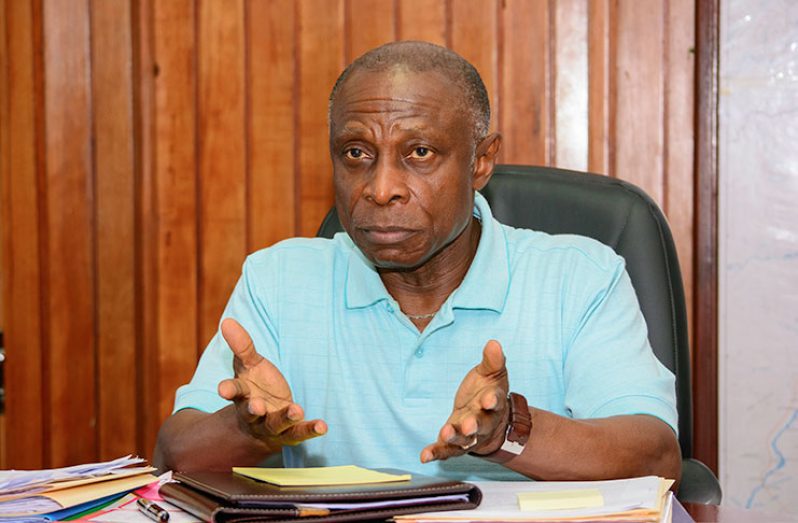–UNASUR Secretary General publishes Venezuela’s claims over Essequibo
GUYANA has strongly objected to the publication of a proposal by the Government and Opposition of Venezuela — to claim rights over the Essequibo — being placed on the website

of the Union of South American States (UNASUR) by Secretary-General of that body, Ernesto Samper.
Published on UNASUR’s website in November, the document confirmed the Venezuelan Government and Opposition’s approval of the “unanimous position in claiming rights over the Essequibo”.
The agreement, part of a five-point pact between the two factions, was brokered by the Vatican; and it confirmed that both political factions hold a “unanimous position in defence of the legitimate and inalienable rights of Venezuela over the Essequibo” in the country’s territorial dispute with neighbouring Guyana. An official joint declaration entitled “Living Together in Peace” was also released.
Guyana’s Vice-President, Foreign Affairs Minister Carl Greenidge, in an interview with Guyana Chronicle on Sunday, described the move by UNASUR Secretary-General Ernesto Samper as “illegal”. He explained that the proposal made by the Venezuelan Government in collaboration with the Opposition “was internal to Venezuela”, and that UNASUR has rules which do not include a mandate to negotiate political disputes between its 12 member states.
“They have no such mandate, and we have found ourselves in a situation where UNASUR has published on its website proposals emanating from Venezuela and proposals that don’t emanate from an official team which includes the Papal Monsignor (a representative of the Pope); and the proposal that has been put on UNASUR’s website is a proposal almost to buy the compliance of the Venezuelan Opposition by a promise to fight for the Essequibo territory,” he declared.
Venezuela’s claim to the Essequibo in Guyana is nothing new, except that UNASUR has published it on its website, whereas it is an internal proposal made by that Spanish-speaking country, he clarified.
“No international agreement [made] after 1899 has addressed or sought to modify the borders of Guyana and Venezuela. That agreement stands; and for an institution such as UNASUR to be publishing a wish of that kind is a problem,” Minister Greenidge declared.
The Foreign Affairs Minister noted that UNASUR, through its governing bodies, did not take a decision on the matter; and Minister Greenidge insists that the decision to publish the agreement was a decision made by Secretary-General Samper, “a man who is supposed to represent the interest of all 12 countries, and in this case we see him publishing a document which no self-respecting entity — multilateral entity — would do.”
He chided Samper, to whom he has written, while stressing that Guyana is a sovereign state and UNASUR has no responsibility or competence in the dispute between the countries.
“One can only be critical of the factors that would drive a regional public servant to do something like this,” he stated.
NO AUTHORITY, MANDATE
Greenidge continued: “He has no authority, no mandate, to entertain these positions. I am just drawing to your attention that we were very concerned by this behaviour by the Secretary-General of UNASUR; we have written him and require that material be sent to other members of the group.”
The minister said a meeting of UNASUR was scheduled for December 3, but that meeting has since been postponed. That meeting was set up to discuss, among other things, the problems of Venezuela and the proposals of solutions to those problems, including an update by the Papal Monsignor on the progress made.
Asked whether UNASUR has been involved in the negotiations on the border controversy, the Foreign Affairs Minister said that, from all indications, the Secretary-General of UNASUR was involved in the negotiations, but the negotiators never reported or endorsed a report from the team.
Minister Greenidge is of the opinion that some members of UNASUR have sought to influence the United Nations Secretary-General’s team and staff.
“I don’t think they have done so formally, as members of the negotiating team. It is not unusual for people to approach entities in a manner intended to intimidate (them),” said Greenidge, who has also alerted UN Secretary-General Ban Ki-moon on the matter.
Upon taking office in 2015, the APNU-AFC coalition Administration made several appeals to regional and international bodies for support on the border controversy; but, Greenidge said, UNASUR was not one of those bodies.
Guyana, meanwhile, hopes that the outgoing UN Secretary-General would announce his “assessment” of the border controversy and forward the matter to the International Court of Justice (ICJ) for final ruling on the 1899 Arbitral Award, which Venezuela has claimed is null and void.
“I don’t want to pronounce on what the Secretary-General is going to do… He is called upon by the Treaty to exercise a function, and I hope that he will do so,” said Greenidge when asked by Guyana Chronicle whether he is hopeful that a decision would be made before Mr. Ban demits office at the end of this month.
“I am reporting to you the hazards that lie in our path as the Secretary-General is reflecting (on what assessment he will make). As he is reflecting, people are trying to persuade him that he shouldn’t do anything, because Venezuela is in trouble and anything he does is going to compound that,” Greenidge stated.
That view is unsupported by Guyana, and the Foreign Affairs Minister made it clear that Venezuela’s internal troubles have nothing to do with Guyana. “They started outside of Guyana and they will end and be resolved without Guyana’s contribution in any way to their state.”
He said, too, that whether Venezuela is stable or unstable, its Government is still taking action to destabilise Guyana; and he stressed that the action of Samper is against the interest of a sovereign member of UNASUR.
NOT UNASUR
“It is the UN that can determine what is a legal border, not UNASUR; not the Secretary-General of UNASUR and not the Venezuelan Opposition either. He (Samper) has responsibilities which he has abused,” Greenidge said.
Samper has, in the past, offered to intervene in the matter, and the Guyana Government outright rejected his offer. Guyana has maintained that it has an agreement (dated 1966) with Venezuela by which such controversies are to be resolved within a specifically crafted framework; and according to the Foreign Affairs Minister, Guyana is not prepared to go outside of the United Nations’ framework.
Last year, the former Guyana Ambassador to Venezuela, Odeen Ishmael (2003-2011), called UNASUR out for what he described to be the body’s “lukewarm” approach to the Guyana-Venezuela border controversy.
In an article published by this newspaper on November 18, 2015 and titled “UNASUR’s lukewarm attitude to border crises”, Ambassador Ishmael said: “By remaining silent on Venezuela’s expanded claim to Guyana’s territory, UNASUR appears to be losing its effectiveness and vibrancy in pronouncing on crucial issues affecting its members. It did act when the presidents of Ecuador and Uruguay mediated the meeting between Maduro and Santos in September, even though no immediate solutions were reached. However, a similar action relative to Guyana and Venezuela has not been forthcoming. Is it because Guyana is a relatively small country in physical size, population and economy, that a threat of usurpation of its territory is ignored, because no one wants to tread on the toes of the larger and more powerful Venezuela? Or is it that the legitimacy of Guyana’s territorial and maritime boundaries is influencing the organisation to adopt a ‘hands-off’ position?”
Guyana has maintained its position: establishing the validity of the Arbitral Award of 1899, which Venezuela claims is null and void, is to have the matter settled by the ICJ. All other processes as outlined in the Geneva Agreement of 1966 have failed to provide a solution to the border controversy.




.png)









